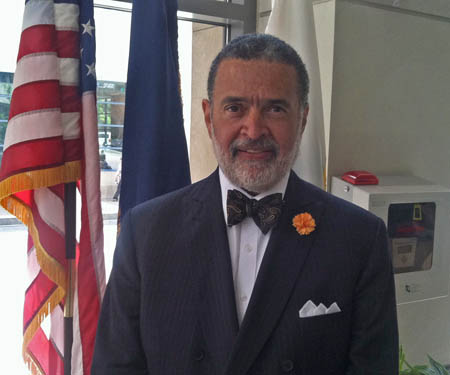Professor Selected as one of the New Pittsburgh Courier's 2014 Men of Excellence Monday, July 14, 2014

Gregory Rogers, J.D., professor of criminal justice and intelligence studies, was chosen as one of the New Pittsburgh Courier's 2014 Men of Excellence. The honorees represent a diverse group of African American men who have displayed proven success within their profession, are positive role models whose contributions encourage others and are active in community service.
What inspired you to pursue an intelligence career?
I cannot recall a specific incident that inspired me. Maybe I was born with it. However, if you look in my high school yearbook you will find I listed being a federal agent as my lifelong desire.
How do you incorporate your real-world experience into the classroom?
I have worked in the field for more than 32 years so when we study a particular subject I experienced, I will relate that experience directly to the subject area. An example would be when we talk about covert and/or undercover operations either in enforcement or intelligence. The fact that I was a special agent/attorney advisor for covert operations, combined with the fact that I was a special operations soldier, allows me to explain the operations of de-confliction centers in a more precise way.
What makes the criminal justice and intelligence studies department unique?
Related links
- Department of Criminal Justice and Intelligence Studies
- Alumni and student success stories
- Schedule a campus visit
- Apply online free
The majority of our professors and adjunct instructors have practical, real-world experience in the field as well as the appropriate degrees to match what they are teaching. We have maintained our contacts in the field and interact frequently with our advisory board consisting of federal, state and local law enforcement executives.
Another unique aspect to our criminal justice program is that our major concentration of study is focused on criminal justice and the functions of the criminal justice system. Our program is based on the Omnibus Crime and Safe Streets Acts passed by the U.S. Congress in 1968, which includes subsequent updates and amendments. We dedicate many courses of study to enforcement, investigations, courts, parole, probation and incarnation. Although we do have courses in criminology, psychology, sociology and victimology, our program is not rooted in those disciplines.
Lastly, Point Park was one of the first three universities in the United States to offer a major in intelligence and national security. We don't just have a few courses for a concentration in intelligence, but a full major. Additionally, we have a graduate program in global security and intelligence that few universities offer.
What do you enjoy most about teaching at Point Park?
The dynamics of the students; I enjoy the diversity of students in our majors and being able to pass along knowledge to new individuals interested in following my path - knowing they will have to be much better than I was. During the Cold War, we basically had only one opposing force. Now there are literally hundreds of groups who want to cause us harm. This generation must be faster, smarter, more disciplined and diverse than ever before to protect our way of life.
Is there anything else you'd like to add?
When I first arrived at Point Park in 2002, our students were getting jobs locally. Now they are landing federal law enforcement, investigative and critical intelligence positions. We also have graduates serving in police departments throughout the country in federal, state and local positions. Many of our students go on to graduate and law schools fully prepared to meet all of the challenges those careers will inevitably put in their path.

